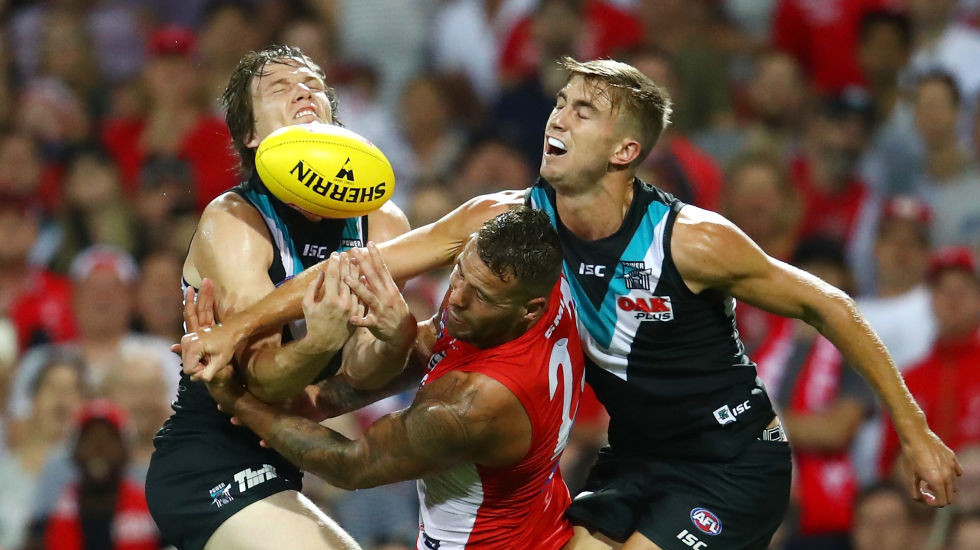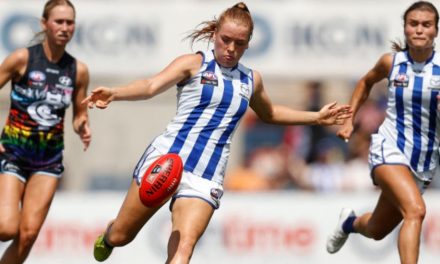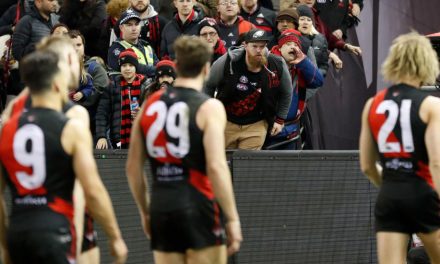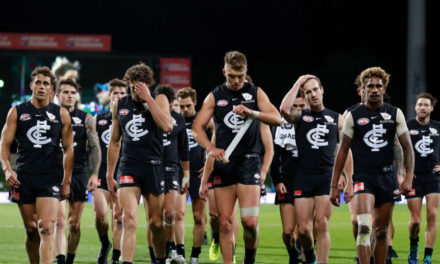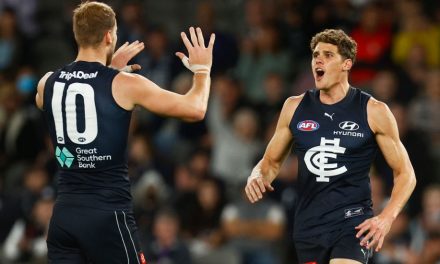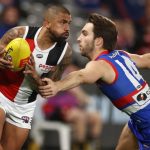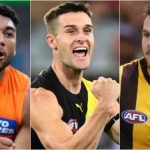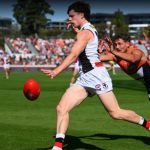Team effort: Port Adelaide’s Jared Polec and Dougal Howard spoil Sydney spearhead Lance Franklin in the Power’s big SCG win. Photo: GETTY IMAGES
RoCo’s Wrap: Two rounds in, two very different stories
Is two rounds into a new AFL season too early to declare a team in crisis? Is it premature to label another the real deal?
Probably. But easy as it is to get caught up in the moment in this age of “hot takes”, there’s at least been some compelling evidence to support either argument over this elongated Easter round, both exhibits coming on the penultimate day of this mini-football marathon.
It’s been an intriguing round, one in stark contrast to the season’s opening, which by and large went according to script. This one certainly hasn’t, even before the Easter Monday Geelong-Hawthorn clash, with just three of the eight favourites thus far getting up.
And the most significant results came at Etihad Stadium, and a little later at the SCG, on Sunday afternoon.
If the Western Bulldogs aren’t in crisis, they’re at least presenting as a team with already an enormous challenge simply to climb back into top eight contention. Port Adelaide, meanwhile, has so far got everything it was aiming for with that well-documented off-season splurge on established senior talent. And then some.
West Coast’s two-point lead at quarter-time against the Bulldogs should really have been more. And once the Eagles got their kicking boots on and grew in confidence, their control over this game was absolute, the lack of resistance from a side which won a premiership just 18 months ago largely based on that quality quite remarkable.
It started, as it often does at Etihad, with the centre bounces, where the Bulldog rucks had no counter to West Coast pair Nic Naitanui and Scott Lycett, who’d allowed them just four hit-outs in a half of football.
And it was most painfully apparent in the clinches. There, the Eagles already led the contested possession count by 23 come half-time. That’s telling enough on its own, let alone in addition to the fact that West Coast had lost the contested count by more than any other team the previous week. And, of course, that the Dogs in their glorious 2016 were the undisputed kings of the hard ball.
Just half of the Bulldogs’ flag-winning team lined-up on Sunday. Matthew Boyd (and Bob Murphy, who famously missed out through injury) have retired. Joel Hamling is at Fremantle, Jake Stringer at Essendon. Tom Liberatore is already out for the season, and Dale Morris half. Liam Picken and Clay Smith could still be weeks away.
Yet the Bulldogs’ made an art form two seasons ago of covering what was at times a horrendous casualty list, their evenness and the capacity of less-heralded and experienced types to slot comfortably into a senior role a huge asset.
Right now, the jobs of greenhorns like Aaron Naughton, Tim English, Billy Gowers and Ed Richards are being made a lot harder, surrounded by a score of experienced teammates playing without confidence, and inescapably, nearly the same levels of hunger they once had.
It’s easy to talk premiership hangovers, but 2017 for the Bulldogs did seem a classic case of a side whose appetite had been well and truly sated. And already it’s appearing as though another off-season has done little to restore it.
It was in Sydney an hour or so later that the Bulldogs could have had a good look at two teams who did have that required intensity. And especially a Port Adelaide outfit that seems to have that driven mindset the Dogs had not all that long ago.
The Power’s 23-point win over the Swans came in by some margin the most pressure-packed game of the season so far. Sydney, though defeated, will at least take solace from its competitiveness. But perhaps also from the fact it lost out to what appears a very good team indeed.
Port’s recruiting spree, in which it picked up Tom Rockliff, Jack Watts and Steven Motlop, plus a handful of other experienced types, was the cause of much debate over summer. So, for much longer, has been its reputation as a “flat-track” bully.
It can be a fine line, though. While the Power did have a miserable 2-8 record against top eight teams last year, no fewer than five of those eight defeats had been by 17 points or less.
They also were both the second-best defensive and offensive side of the season , a better balance even than the teams which finished above them. Which all suggested they didn’t need a massive improvement to become a much greater threat.
The recruits, meanwhile, have given what was already a reasonably dynamic line-up even greater flexibility. And there was a very apparent pay-off in the second half against the Swans.
Robbie Gray and Chad Wingard were already the AFL’s best midfielder/forwards, capable of playing to All-Australian levels in either slot. Last season, Travis Boak added the small forward role to his skill set. Rockliff, Watts and Motlop can all play the same dual role.
So it was no surprise that Ken Hinkley was able to shuffle his deck significantly at the long break on Sunday with his side lucky to be only 14 points in arrears, having been smashed 35-14 on the inside 50 count. The impact was stunning.
Port went much smaller up forward, Charlie Dixon moving into the ruck, Todd Marshall off, Justin Westhoff to a wing, and at one stage Watts the only remotely taller type near goal, surrounded by Boak, Gray, Wingard and Brad Ebert.
That still, however, left Ollie Wines, Jared Polec, Sam Powell-Pepper and a score of others to share the grunt work further afield. Boak kicked the first two goals of the third term to turn the momentum, and had a hand in the first four as Port slammed on seven for the quarter, then held its nerve as Sydney crept within four points again early in the last.
It was the resilience, and the victory, that a considerable army of sceptics had been demanding. One suspects they’ll have a lot less ammunition this season. And perhaps more obvious targets. Like a certain premiership team of 18 months ago.

